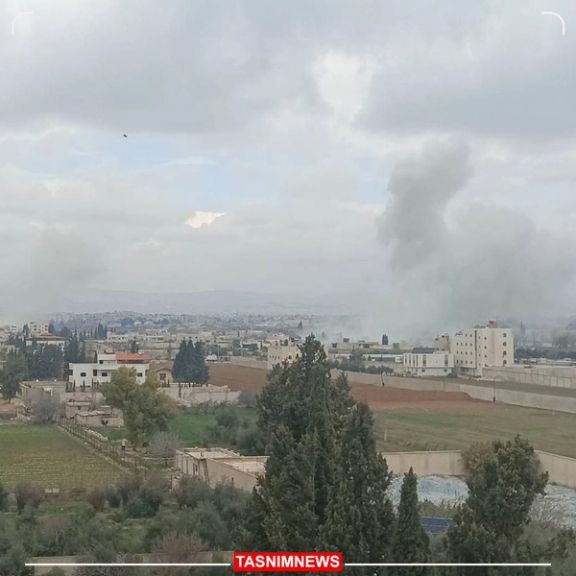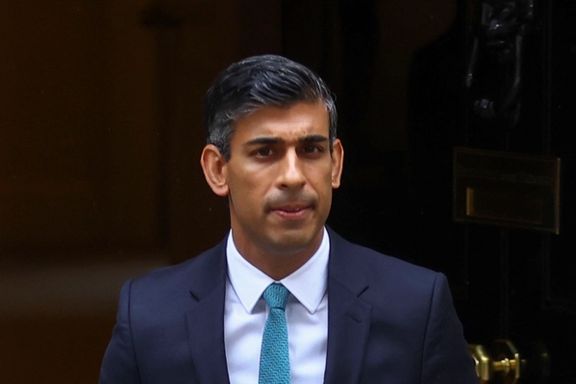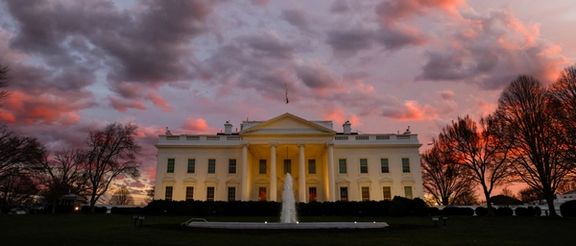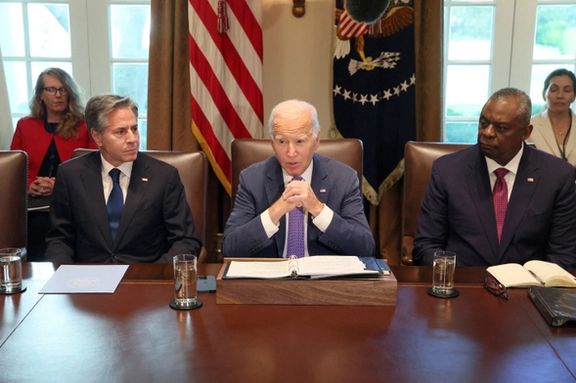Yemen’s Houthis Claim Attack On US Warship

Yemen’s Houthi militia claimed on Monday to have attacked a US Navy mobile base at sea, alleging the targeting of the USS Lewis B. Puller by a ballistic missile.

Yemen’s Houthi militia claimed on Monday to have attacked a US Navy mobile base at sea, alleging the targeting of the USS Lewis B. Puller by a ballistic missile.
The USS Lewis B. Puller functions as a floating landing base and was previously stationed in the Arabian Sea as part of US efforts to counter Iran-backed Houthi attacks on commercial shipping in the Red Sea and Gulf of Aden.
Houthi military spokesperson Brig. Gen. Yahya Saree claimed that a missile was fired at the Puller in the Gulf of Aden on Sunday, but no evidence was presented to substantiate the claim.
Houthi attacks will continue “until the aggression is stopped, and the siege is lifted on the people of Palestine in the Gaza Strip,” Saree said in the statement.
However, a US defense official, speaking anonymously about intelligence matters, stated that there had been no reported attack on the Puller.
The Houthis have previously launched missiles that failed to reach their intended targets, posing risks to both land and sea.
Since November, the Houthis have targeted ships in the Red Sea amid Israel’s offensive in Gaza against Hamas. The attacks have jeopardized shipping in a critical trade route between Asia, the Middle East, and Europe.
The Iranian regime and its regional proxies have been implicated in attacks against the US and its allies almost daily since mid-October. However, the Biden administration has yet to devise an effective strategy to alter the pattern of behavior.

Media reports indicate an attack on the headquarters of Iran's Islamic Revolutionary Guard Corps (IRGC) in the "Sayyidah Zainab" area in southern Damascus.
Iranian and Syrian sources claim the attack was launched by Israel, but there is no official acknowledgement about who was behind the missile strike. Syrian state media, blaming Israel, said that "a number of Iranian advisers" were killed, in a rare acknowledgment by Damascus of Iranian casualties in Israeli strikes on Syrian territory.
The reported attack followed the killing of three US soldiers overnight on Sunday when Iran-backed militia forces fired a drone at an American base on the Jordanian-Syrian border.
Al-Arabiya network has identified the targeted location in Syria as the command center of forces affiliated with the Islamic Republic. Reuters, citing a source close to Iran, reported that the attack targeted a base used by the IRGC. Later, Iran's ambassador to Syria denied that the IRGC headquarters was hit, while Tasnim news agency in Tehran affiliated with the Revolutionary Guards did confirm the target.
Following this attack, the Islamic Republic of Iran's state television reported the deaths of two individuals, describing the attack as occurring in a "residential area." State media added that "a residential building in the Aqraba area near Zainabiyah" was the target.
A source in Iran's regional alliance told Reuters the strike had hit a location used by Iran's Revolutionary Guard Corps. However, it is not clear who launched the attack. Israel has also been targeting Iran-affiliated military sites for years.
US President Joe Biden on Sunday vowed to retaliate against the attack, as lawmakers and former US officials expressed outrage at the deadly attack, which they see as an Iranian declaration of war.
US troops in Iraq and Syria have been facing constant missile and drone strikes since last October when Israel began its onslaught on Gaza in response to Hamas’ rampage of the Israeli border communities. This is the first time, however, that such strikes have resulted in loss of American life – which many in Washington consider to be a red line.
The loss of life, after repeated warnings by his Iran policy critics, has left Biden with very little option but to escalate.

UK Prime Minister Rishi Sunak has urged Iran to de-escalate tensions in the Middle East after a drone attack by Tehran-backed forces killed three US soldiers in Jordan.
“We are concerned and would urge Iran to continue to de-escalate tensions in the region…We absolutely condemn what has happened over the past couple of days,” Sunak said on Monday.
US President Joe Biden on Sunday vowed to retaliate against the attack, as lawmakers and former US officials expressed outrage at the deadly attack, which they see as an Iranian declaration of war.
Britain, the closest US ally in Europe, joined the United States this month in launching retaliatory strikes against Yemen’s Houthi forces, armed and supported by Iran. The Houthis have been attacking international maritime traffic in the Red Sea since mid-November, after Iran’s Supreme Leader Ali Khamenei called on Muslim countries to blockade Israel.
Sunak expressed his concern as the world expects an imminent US retaliatory attack possibly in Syria, Iraq or even at Iranian targets.
“We stand resolutely with our allies to bring stability and peace to the region…And that’s what we’ll continue to work towards,” the Prime minister said.

Iranian Foreign Minister Hossein Amir-Abdollahian has pointed fingers at third countries for supporting militants in the border regions of Pakistan and Iran.
Addressing a joint press conference alongside Pakistan’s Interim Foreign Minister Jalil Abbas Jilani in Islamabad on Monday, Amir-Abdollahian asserted, "There is no doubt that the terrorists located in the common border regions and areas of Iran and Pakistan are led and supported by third countries and they never favor any good action in line with the benefits of the Iranian and Pakistani governments and nations."
Amir-Abdollahian's visit to Pakistan follows escalating tensions triggered by an Iranian missile strike in Pakistan earlier this month, prompting Islamabad to launch a similar attack against what it said were terrorist hideouts in Iran's Sistan-Baluchestan province. The situation worsened with the recent killing of nine Pakistani workers by unidentified assailants in the same region, further straining relations between the two nations. Pakistan has called for a thorough investigation and prosecution of those responsible for the attack.
For his part, interim Foreign Minister Jilani acknowledged terrorism as a mutual challenge for both countries and stressed the importance of respecting each other's sovereignty and integrity as a fundamental step towards cooperation.
Iran and Pakistan maintain a turbulent yet functioning relationship. Border clashes, often involving groups like Jaish al-Adl, have sporadically erupted, with the militant organization claiming responsibility for attacks on Iranian border patrols.

The fifth and concluding trial session of Johan Floderus, a 33-year-old Swedish citizen and diplomat of the European Union, was held in Tehran.
Floderus has been detained by the security forces of the Islamic Republic since April 2022 on what appears to be trumped up charges of espionage.
According to reports from Fars News Agency, affiliated with the Revolutionary Guards, the session took place on Sunday at the Tehran Revolutionary Court. The judge reiterated charges against Floderus, including "corruption on earth through actions against national security," "assembly and collusion with the intention of committing a crime against national security," and "intelligence cooperation" with Israel.
The judge based the accusations on reports from Iran's security apparatus, along with evidence such as Floderus’ presence in Iranian border cities and his travels to various countries, including Israel.
During the session, the prosecutor's representative urged for the strictest punishment for the Swedish citizen. Floderus and his legal team have been granted one week to present their final defense statement to the court.
Floderus, a graduate of Oxford University, previously served in the Afghanistan desk of the EU’s external services department. His detention is seen by observers as potentially linked to Tehran's efforts to exert pressure on the Swedish government. The pressure could be aimed at securing the release of Hamid Nouri, a former judicial official of the Islamic Republic, who has been sentenced to life imprisonment for involvement in the massacre of political prisoners in the 1980s, in which up to 5,000 were executed.
The Stockholm Court of Appeals upheld Nouri's life sentence in December.

President Joe Biden is under increasing pressure to retaliate against Iran following an attack by Iran-backed militias that killed three US soldiers and wounded 34.
US troops in Iraq and Syria have been facing constant missile and drone strikes since last October when Israel began its onslaught on Gaza in response to Hamas’ rampage of the Israeli border communities. This is the first time, however, that such strikes have resulted in loss of American life – which many in Washington consider to be a red line.
The loss of life, after repeated warnings by his Iran policy critics, has left Biden with very little option but to escalate.
Biden and Secretary of Defense Lloyd Austin vowed Sunday evening to “hold all those responsible to account,” pointing out in clear terms who they had in mind. “We know it was carried out by radical Iran-backed militant groups operating in Syria and Iraq,” Biden said.

Tehran claimed innocence almost immediately, continuing its policy of 'plausible deniability.' “Iran has nothing to do with these attacks,” Iran’s official news agency IRNA quoted the country’s UN representative as saying. “The hostilities are between the US army and the resistance forces in the region that are engaged in tit-for-tat attacks.“
This message is unlikely to be taken seriously at the Pentagon or the White House, though, where, according to various reports, top level deliberations were underway Sunday evening to decide on an appropriate response.
But what would that response be?
“Washington could sink the Iranian navy, like then President Ronald Reagan did in the 1980s,” wrote Matthew Kroenig, vice president of the Atlantic Council. “It could strike Iranian naval bases. It could target Iranian leadership, following in the footsteps of then President Donald Trump’s killing of Iranian General Qassem Soleimani.”
That is in fact the incident many cite to argue that Biden’s fear of Iran’s retaliation is unfounded, since, the argument goes, the regime’s “hard revenge” for Soleimani was no more than a missile strike on a US base with enough notice for the personnel to evacuate.
A more controversial, and perhaps less likely, response could be to target Iran’s “nuclear and missile program,” Kroenig suggested, “which must be addressed soon regardless, as the Pentagon estimates its nuclear breakout timeline to be only twelve days.”
Any such scenario, and many more being discussed in US media, would be harsher than what President Biden has ever countenanced. But it has been that very unwillingness to be tough, his critics say, that has led to the loss of American life –and to this fateful moment for Biden’s political fortunes in an election year.
“The sorry truth is that these casualties are the result of the President’s policy choices,” reads the Wall Street Journal’s editorial Monday. “The President has put his anxieties about upsetting Iran and risking escalation above his duty to defend U.S. soldiers abroad.”
This is perhaps as harsh a criticism as a US President can get. And yet it's become so strikingly commonplace in Joe Biden’s case.
Questions are also being asked as to why the air defense systems at the US base (T-22 in northeast Jordan, bordering Syria) did not detect or shoot down the drone(s). According to the latest reports, 8 of the 34 injured soldiers have been airlifted to another country for treatment.
Any further loss of life could intensify pressures on the Biden administration to confront Iran directly, especially in an election year, with Donald Trump as the likely opponent, who, not surprisingly, is making the most of Biden’s predicament.
“Three years ago, Iran was weak, broke, and totally under control,” Trump said in a statement Sunday night. “Then Joe Biden came in and gave Iran billions of dollars, which the Regime has used to spread bloodshed and carnage throughout the Middle East. This attack would NEVER have happened if I was President, not even a chance.”
Many other Republicans also attacked Biden and his team for “appeasing” the regime in Iran and allowing it to undermine American interests in the Middle East undeterred.
“The only answer to these attacks must be devastating military retaliation against Iran’s terrorist forces,” Senator Tom Cotton said in a statement. “Anything less will confirm Joe Biden as a coward.”.
Many other GOP heavyweights joined in on the attack on the President , including minority leader Senator Mitch McConnell, the Armed Service Committee member Senator Rick Scott, and the committee’s Ranking Member Senator Roger Wicker.
“We must respond to these repeated attacks by Iran and its proxies by striking directly against Iranian targets and its leadership,” Wicker posted on X. “The Biden administration's responses thus far have only invited more attacks. It is time to act swiftly and decisively for the whole world to see.”
Some Democrats also called for action, in a clear sign of the hardening of moods on the Capitol.
“Every single malignant actor responsible must be held accountable,” the House minority leader Hakeem Jeffries wrote on X.
President Biden has said that the United State would retaliate at a time and in a way that it sees fit. If the mood in Washington is any indication, the response should be hard and delivered early.